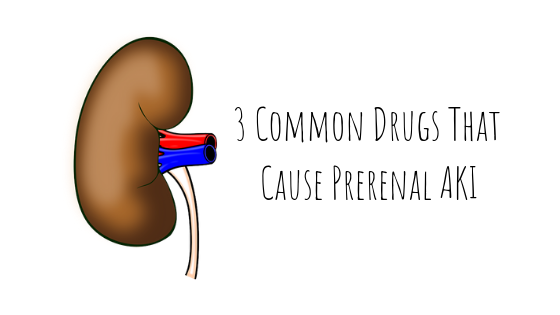Prerenal acute kidney injury is absolutely something that happens in real life practice. One of the reasons that this is something that is seen on a somewhat regular basis is that the drugs that can cause prerenal acute kidney injury are very common.
Diuretics, Diuretics, Diuretics
Any medication that can promote the loss of fluid can cause dehydration, and ultimately prerenal acute kidney injury (AKI). Loop and thiazide diuretics are two extremely common medications that increase fluid loss out of the body and can cause dehydration. When the vessels don’t have enough fluid in them, the blood pressure within the kidney falls. With inadequate pressure, the supply of nutrients and oxygen dwindles, leaving the kidney damaged and not functioning properly.
What makes things really challenging is when patients need diuretics for heart failure. There is a very delicate balance between running fluid off and running too much off and causing prerenal acute kidney injury.
ACE Inhibitors and ARBs
The glomerular filtration rate is very dependent on angiotensin 2. We know that angiotensin 2 can cause vasoconstriction which is a good thing to maintain adequate pressure in the kidney, but in many patients, an overabundance or overactivity of angiotensin 2 can cause hypertension. By reducing or blocking angiotensin 2, we can help manage blood pressure, but can also run the risk of reducing the pressure in the kidney, leading to prerenal AKI.
The exact mechanism of reducing that pressure in the glomerulus is through blocking vasoconstriction of the efferent arteriole. (I remember “E” = exits) The efferent arteriole is the one that exits the glomerulus. If the pressure gets too low, this can lead to AKI.
NSAIDs
NSAIDs work on the afferent arteriole. The afferent arteriole is the vessel running into the glomerulus. NSAIDs through their actions on prostaglandins can cause vasoconstriction on the afferent arteriole. This essentially allows less fluid to come into the glomerulus and effectively reduces the overall pressure. This loss in pressure to the glomerulus can inhibit the function and lead to AKI.
You can begin to understand how using all three of these agents together can really put a strain on the kidney and increase the risk of prerenal AKI.
- 30 medication mistakes PDF
- 18+ Page Drug Interaction PDF
- 10 Commandments of Polypharmacy Webinar based on my experiences in clinical practice



Can Immodium cause AKI?